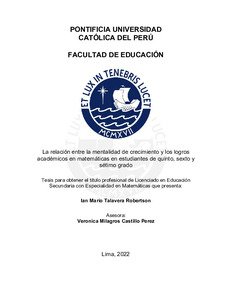| dc.contributor.advisor | Castillo Perez, Veronica Milagros | |
| dc.contributor.author | Talavera Robertson, Ian Mario | |
| dc.date.accessioned | 2022-03-27T22:56:24Z | |
| dc.date.available | 2022-03-27T22:56:24Z | |
| dc.date.created | 2022 | |
| dc.date.issued | 2022-03-27 | |
| dc.identifier.uri | http://hdl.handle.net/20.500.12404/21980 | |
| dc.description.abstract | El propósito de la presente investigación es estudiar la relación entre la mentalidad de
crecimiento y el rendimiento en matemáticas en la transición entre la primaria y la secundaria.
Asimismo, se trata de investigar si las diferencias en la mentalidad de crecimiento permiten
explicar rendimientos disímiles entre hombres y mujeres en matemáticas en el mismo
contexto. Participaron 135 estudiantes de una institución educativa privada de Lima
Metropolitana. Se aplicó un cuestionario referido a la mentalidad de crecimiento y se analizó
las propiedades psicométricas de este instrumento. Se encuentra que la mentalidad de
crecimiento está positivamente correlacionada con el rendimiento en matemáticas de los
estudiantes, aunque de manera débil. El coeficiente de correlación de Spearman entre la
mentalidad de crecimiento y los logros académicos en 5° grado es 0,260 (p<0,001) y en 6°
grado es 0,236 (p<0,001). La correlación entre la mentalidad de crecimiento y los logros en
matemáticas en 7° grado no es estadísticamente significativa, aunque esto puede deberse al
menor tamaño de la muestra. En relación con las diferencias entre los géneros, no se
encuentra una diferencia estadísticamente significativa en las medias de la mentalidad de
crecimiento. Aunque no se encuentra diferencia entre los logros académicos en matemáticas
de hombres y mujeres, sí se encuentra una diferencia estadísticamente significativa entre los
resultados en pruebas estándar de matemáticas. En función a los resultados obtenidos, se
concluye que la mentalidad de crecimiento no es un mecanismo que explique las diferencias
encontradas. | es_ES |
| dc.description.abstract | The purpose of this research is to study the relationship between growth mindset and
mathematics achievement in the transition between primary and secondary school.
Furthermore, we tried to investigate whether differences in growth mindset can explain
dissimilar performances between men and women in mathematics in this same context. 135
students from a private educational institution in Metropolitan Lima participated. A
questionnaire on growth mentality was applied and the psychometric properties of this
instrument were analyzed. Growth mindset is found to be positively correlated with student
math performance, albeit weakly. The Spearman correlation coefficient between growth
mindset and academic achievement in 5th grade is 0.260 (p <0.001) and in 6th grade it is 0.236
(p <0.001). The correlation between growth mindset and math achievement in 7th grade is not
statistically significant, although this may be due to the smaller sample size. Regarding the
differences between the genders, no statistically significant difference is found in the means of
growth mindset. No difference is found between male and female academic achievement in
mathematics. A statistically significant difference between the results in standard mathematics
tests between men and women is found. Taking these results into consideration, we find no
evidence that growth mindset is a mechanism that explains the differences found. | es_ES |
| dc.language.iso | spa | es_ES |
| dc.publisher | Pontificia Universidad Católica del Perú | es_ES |
| dc.rights | info:eu-repo/semantics/openAccess | es_ES |
| dc.rights.uri | http://creativecommons.org/licenses/by/2.5/pe/ | * |
| dc.subject | Matemáticas--Estudio y enseñanza (Primaria) | es_ES |
| dc.subject | Matemáticas--Estudio y enseñanza (Secundaria) | es_ES |
| dc.subject | Motivación para el rendimiento | es_ES |
| dc.subject | Adolescentes--Educación | es_ES |
| dc.title | La relación entre la mentalidad de crecimiento y los logros académicos en matemáticas en estudiantes de quinto, sexto y sétimo grado | es_ES |
| dc.type | info:eu-repo/semantics/bachelorThesis | es_ES |
| thesis.degree.name | Licenciado en Educación Secundaria con especialidad en Matemáticas | es_ES |
| thesis.degree.level | Título Profesional | es_ES |
| thesis.degree.grantor | Pontificia Universidad Católica del Perú, Facultad de Educación | es_ES |
| thesis.degree.discipline | Educación Secundaria con especialidad en Matemáticas | es_ES |
| renati.advisor.dni | 10728565 | |
| renati.advisor.orcid | https://orcid.org/0000-0003-1861-111X | es_ES |
| renati.author.dni | 10263056 | |
| renati.discipline | 121826 | es_ES |
| renati.juror | Castillo Perez, Veronica Milagros | es_ES |
| renati.juror | Advincula Clemente, Elizabeth Milagro | es_ES |
| renati.juror | Diana Mercedes Revilla Figueroa | es_ES |
| renati.level | https://purl.org/pe-repo/renati/level#tituloProfesional | es_ES |
| renati.type | https://purl.org/pe-repo/renati/type#tesis | es_ES |
| dc.publisher.country | PE | es_ES |
| dc.subject.ocde | https://purl.org/pe-repo/ocde/ford#5.03.01 | es_ES |






